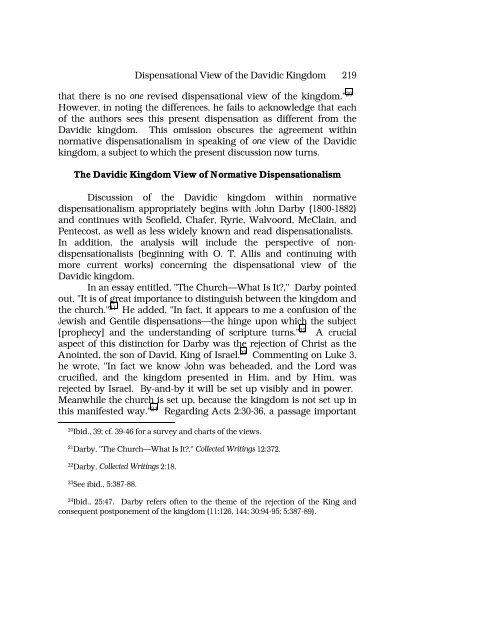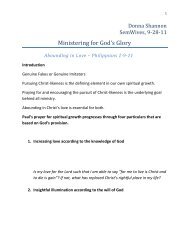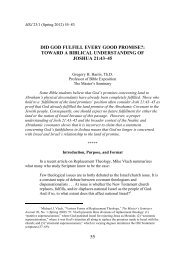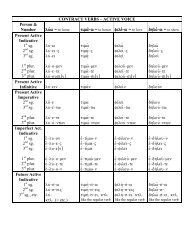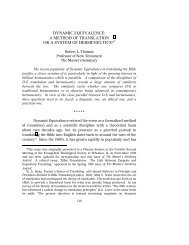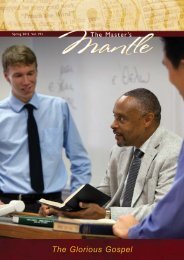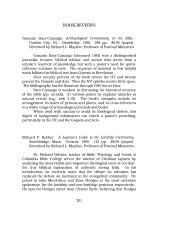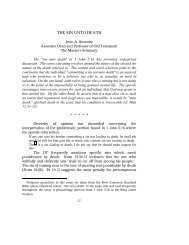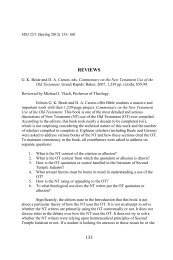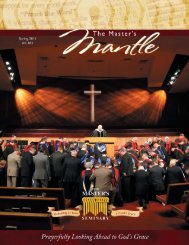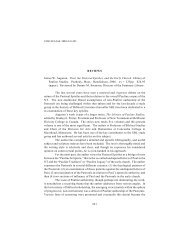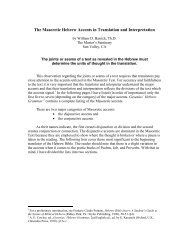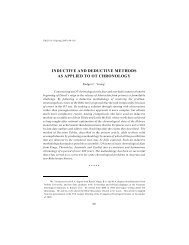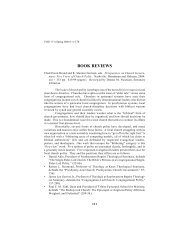The Dispensational View of the Davidic Kingdom - The Master's ...
The Dispensational View of the Davidic Kingdom - The Master's ...
The Dispensational View of the Davidic Kingdom - The Master's ...
Create successful ePaper yourself
Turn your PDF publications into a flip-book with our unique Google optimized e-Paper software.
<strong>Dispensational</strong> <strong>View</strong> <strong>of</strong> <strong>the</strong> <strong>Davidic</strong> <strong>Kingdom</strong> 219that <strong>the</strong>re is no one revised dispensational view <strong>of</strong> <strong>the</strong> kingdom." 20However, in noting <strong>the</strong> differences, he fails to acknowledge that each<strong>of</strong> <strong>the</strong> authors sees this present dispensation as different from <strong>the</strong><strong>Davidic</strong> kingdom. This omission obscures <strong>the</strong> agreement withinnormative dispensationalism in speaking <strong>of</strong> one view <strong>of</strong> <strong>the</strong> <strong>Davidic</strong>kingdom, a subject to which <strong>the</strong> present discussion now turns.<strong>The</strong> <strong>Davidic</strong> <strong>Kingdom</strong> <strong>View</strong> <strong>of</strong> Normative <strong>Dispensational</strong>ismDiscussion <strong>of</strong> <strong>the</strong> <strong>Davidic</strong> kingdom within normativedispensationalism appropriately begins with John Darby (1800-1882)and continues with Sc<strong>of</strong>ield, Chafer, Ryrie, Walvoord, McClain, andPentecost, as well as less widely known and read dispensationalists.In addition, <strong>the</strong> analysis will include <strong>the</strong> perspective <strong>of</strong> nondispensationalists(beginning with O. T. Allis and continuing withmore current works) concerning <strong>the</strong> dispensational view <strong>of</strong> <strong>the</strong><strong>Davidic</strong> kingdom.In an essay entitled, "<strong>The</strong> Church—What Is It?," Darby pointedout, "It is <strong>of</strong> great importance to distinguish between <strong>the</strong> kingdom and<strong>the</strong> church." 21 He added, "In fact, it appears to me a confusion <strong>of</strong> <strong>the</strong>Jewish and Gentile dispensations—<strong>the</strong> hinge upon which <strong>the</strong> subject[prophecy] and <strong>the</strong> understanding <strong>of</strong> scripture turns." 22 A crucialaspect <strong>of</strong> this distinction for Darby was <strong>the</strong> rejection <strong>of</strong> Christ as <strong>the</strong>Anointed, <strong>the</strong> son <strong>of</strong> David, King <strong>of</strong> Israel. 23 Commenting on Luke 3,he wrote, "In fact we know John was beheaded, and <strong>the</strong> Lord wascrucified, and <strong>the</strong> kingdom presented in Him, and by Him, wasrejected by Israel. By-and-by it will be set up visibly and in power.Meanwhile <strong>the</strong> church is set up, because <strong>the</strong> kingdom is not set up inthis manifested way." 24 Regarding Acts 2:30-36, a passage important20Ibid., 39; cf. 39-46 for a survey and charts <strong>of</strong> <strong>the</strong> views.21Darby, "<strong>The</strong> Church—What Is It?," Collected Writings 12:372.22Darby, Collected Writings 2:18.23See ibid., 5:387-88.24Ibid., 25:47. Darby refers <strong>of</strong>ten to <strong>the</strong> <strong>the</strong>me <strong>of</strong> <strong>the</strong> rejection <strong>of</strong> <strong>the</strong> King andconsequent postponement <strong>of</strong> <strong>the</strong> kingdom (11:126, 144; 30:94-95; 5:387-89).


